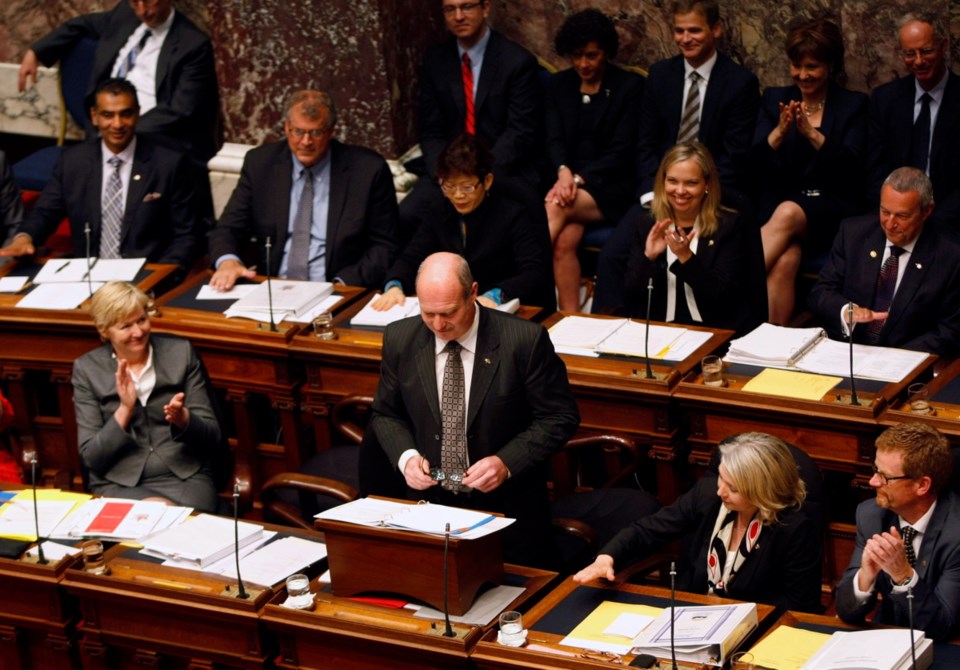A lacklustre economy has tightened B.C.’s razor-thin budget and forced yet another round of government cost-cutting, the province’s finance minister says.
B.C.’s pre-election budget surplus of $197 million in February has shrunk to a projected $153 million because of lower-than-expected economic growth, Finance Minister Mike de Jong said Thursday as he introduced a budget update.
That will mean a fifth-straight year of austerity measures for the provincial government, which has already seen more than $3 billion in spending hacked out of ministries and services since the global economic recession in 2009.
The latest cuts include $30 million in efficiencies — on top of $15 million in cuts announced in February — and $100 million in savings to be found as part of a core review of government services by 2016.
That remains a fraction of the overall $43-billion budget. “Now, that sounds easy,” de Jong said. “It’s not actually that easy, because we have been finding savings and holding the line on expenditures for some time now.”
The Liberal government began taking an axe to government spending in 2009, promising $3.4 billion in cuts to advertising, professional services, travel, office expenses and service contracts.
That was followed by layoff notices, a hiring freeze within the civil service, additional belt-tightening and then another $1 billion in cuts earmarked for 2012 to 2015.
The next 12 to 18 months “are going to be tough” for the government, de Jong said, although he doesn’t expect massive layoffs within the civil service.
“You won’t hear any argument from me on how tight and how much discipline is going to have to be demonstrated to achieve the numbers,” he said.
The thin $153-million surplus is worrisome, he said.
“Am I absolutely satisfied or comfortable? No … I won’t profess to be entirely comfortable, but the numbers are what they are.”
Overall, government revenue has dropped $124 million from the February projections, according to budget documents. The government is pulling $50 million out of its forecast allowance to help make up some of the difference, with ministry cost-cutting accomplishing the rest, de Jong said.
Employment, retail sales and housing starts are all down. The economy is expected to grow 1.4 per cent this year — slightly less than forecast in February.
In response, the government said, it will sharply curtail spending growth to an average of 1.6 per cent, while throttling health spending — the largest single budget expense — to only 2.6 per cent.
That will make for a “grim” summer of health-care cutbacks and new fees, said Mike Old of the Hospital Employees’ Union.
No new spending or capital projects were announced, although the budget did reaffirm a few goodies promised to taxpayers by the Liberal government before the May election.
A B.C. Training Education Savings Grant of $1,200 per child born after January 2007 remains unchanged, as does the B.C. Early Childhood Tax Credit of up to $55 a month for each child younger than six.
Previous tax increases also remained in effect. Medical Service Plan premiums rise by four per cent in 2014. The corporate tax rate increased by one per cent. A two-year “temporary” two per cent personal income tax hike on people who earn more than $150,000 also remained. The tobacco tax goes up $2 per carton of cigarettes.
Key to balancing the budget is the sale of more than 100 surplus government properties and assets. So far, the government has sold 37 per cent of a targeted $475 million in surplus assets.
Total debt is set to climb to $62.6 billion in 2013-14 and is now increasing at a rate faster than was forecast in February.
That appears to be at odds with Premier Christy Clark’s election promise to wipe out the debt within 15 years, the Opposition NDP said.
“So much for a debt-free B.C.,” said Mike Farnworth, the NDP finance critic.
This budget is no more credible than the one tabled in February, Farnworth said.



